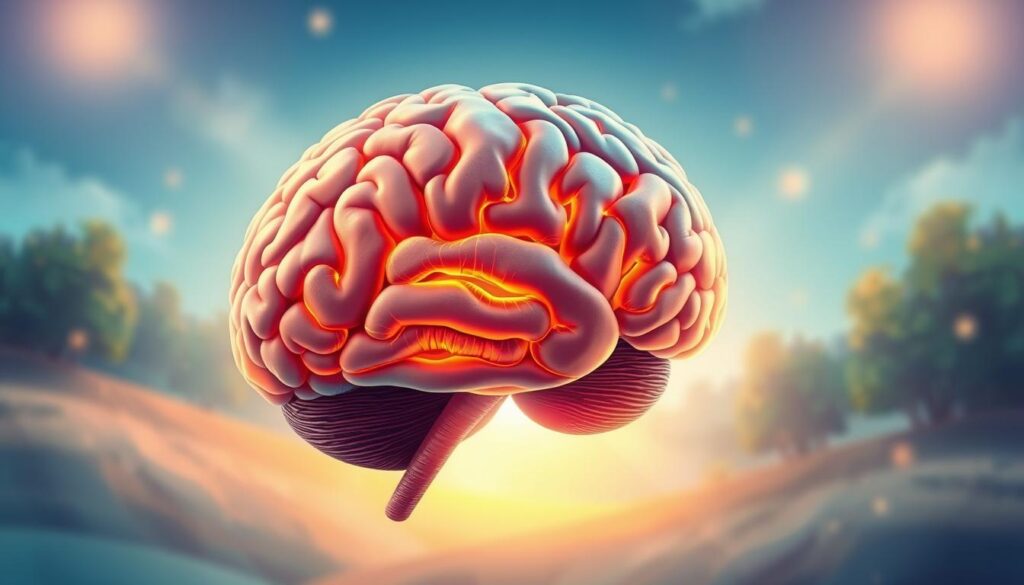Can a short burst of physical activity really boost brain function? Recent research suggests that incorporating a minimal amount of exercise into your daily routine can have a significant impact on brain health.
A new study has found that older adults who engage in moderate-to-vigorous physical activity during the day experience improved processing speed, working memory, and executive function compared to those who are less active.
This groundbreaking research challenges the notion that extensive workout sessions are necessary for cognitive function and highlights the potential benefits of short bursts of exercise for overall health.
Key Takeaways
- Short bursts of physical activity can improve brain function in older adults.
- Moderate-to-vigorous exercise is linked to better processing speed and working memory.
- Incorporating minimal exercise into daily routine can have significant cognitive benefits.
- The study’s findings challenge traditional notions of exercise and cognitive function.
- Short bursts of exercise can be a practical and accessible way to improve overall health.
The Surprising Brain Benefits of Brief Physical Activity
Scientists have made a surprising discovery about the effects of short bursts of physical activity on the brain. Recent research has shown that even a small amount of physical activity can have a significant impact on cognitive function and brain health.
Research indicates that the largest cognitive improvements were observed in individuals who started with no vigorous activity and then engaged in just 5 minutes of it daily. This “threshold effect” suggests that introducing higher-intensity activity provides more significant benefits compared to gradual increases from an already active baseline.
Key Findings from the New Research
The study found that even brief periods of elevated heart rate can trigger neurological processes that support brain health and cognitive function. The key findings can be summarized as follows:
- Participants who transitioned from no vigorous activity to 5 minutes daily experienced the largest cognitive improvements.
- The initial introduction of higher-intensity activity provides disproportionate benefits.
- Even small increases of moderate-to-vigorous physical activity may be favorable for cognitive function.
Why Even Small Amounts of Exercise Matter
For sedentary individuals or those with limited mobility, this finding offers an achievable entry point to begin experiencing cognitive benefits. The study challenges the “all-or-nothing” mentality that often discourages people from beginning exercise programs, showing that even minimal efforts yield meaningful results.
The researchers have compiled some key data in the table below:
| Physical Activity | Cognitive Function | Brain Health |
|---|---|---|
| No vigorous activity | Lower cognitive function | Poor brain health |
| 5 minutes of vigorous activity | Improved cognitive function | Improved brain health |
Just 5 Minutes of Physical Activity a Day May Protect Brain Health
New findings suggest that even a minimal amount of physical activity, just 5 minutes a day, can have substantial benefits for the brain. This revelation comes from recent research that has been delving into the impacts of short periods of physical activity on cognitive performance.
The study, known as the IGNITE trial, provides crucial insights into how brief periods of physical activity can influence brain health.
Study Details: The IGNITE Trial
The IGNITE trial, a comprehensive research project, was designed to explore the relationship between physical activity and cognitive function. The study focused on the impacts of moderate-to-vigorous physical activity on brain health, examining how even short periods of such activity could influence cognitive performance.

From Zero to Five Minutes: The Biggest Cognitive Gains
The researchers discovered that the biggest cognitive gains were seen in participants who went from doing no vigorous physical activity to a minimum of 5 minutes a day. As Collins noted, “Our results suggest that hypothetically reallocating time to moderate-to-vigorous physical activity may be beneficial for cognitive function, regardless of what lifestyle behavior this time was reallocated from.”
Some key findings from the study include:
- The most dramatic cognitive improvements were observed in participants who transitioned from complete inactivity to just 5 minutes of vigorous physical activity daily.
- The study found a non-linear relationship between exercise and brain benefits, with initial activity providing disproportionate returns.
- Cognitive gains occurred regardless of which sedentary behaviors were replaced.
These findings have significant implications, suggesting that even small increases in physical activity can be beneficial. As such, the study supports the idea that incorporating just a few minutes of physical activity into daily routines can protect brain health and enhance cognitive performance.
How Exercise Improves Cognitive Performance
Exercise has been found to have a profound impact on cognitive performance, with even short periods of activity showing significant benefits. Research has shown that physical activity enhances various aspects of cognition, including processing speed, working memory, and executive function.
Enhanced Processing Speed and Working Memory
Physical activity has been found to enhance processing speed and working memory, crucial elements of cognitive function. Studies have demonstrated that even brief periods of moderate-to-vigorous physical activity can lead to improvements in these areas. For instance, a study found that participants who engaged in short bursts of physical activity showed enhanced processing speed and working memory compared to those who did not.

Boosting Executive Function in Older Adults
Executive function, which encompasses a set of higher-order cognitive processes including planning, focused attention, self-regulation, and mental flexibility, is particularly vulnerable to age-related decline. Research has shown that older adults who engage in moderate-to-vigorous physical activity exhibit significant improvements in executive function. Key aspects of executive function that are enhanced by physical activity include:
- Planning and decision-making abilities
- Focused attention and mental flexibility
- Self-regulation and adaptability
These improvements translate to better decision-making, enhanced ability to multitask, and greater capacity to adapt to changing circumstances, thus maintaining independence in older adults.
The Science Behind Physical Activity and Brain Health
The science behind physical activity and brain health reveals several important insights. As we age, our brains undergo various changes that can lead to cognitive decline. However, research has shown that physical activity can counteract many of these changes.
Increased Blood Flow and Oxygen to the Brain
One of the primary ways exercise benefits brain health is by increasing blood flow and oxygen delivery to the brain. This enhanced vascular function supports the health of brain tissue and promotes optimal cognitive performance. Regular physical activity has been shown to improve cardiovascular health, which in turn benefits brain function.
Brain-Derived Neurotrophic Factor (BDNF) Production
Exercise has been found to stimulate the production of Brain-Derived Neurotrophic Factor (BDNF), a protein that plays a crucial role in the growth, maintenance, and functioning of neurons. Higher levels of BDNF are associated with improved cognitive function and a reduced risk of neurodegenerative diseases.
Protective Effects Against Age-Related Decline
Physical activity has been shown to have protective effects against age-related decline in brain health. The table below summarizes some of the key findings:
| Age-Related Change | Effect of Physical Activity |
|---|---|
| Brain Volume Loss | Maintains brain volume |
| Cortical Thinning | Preserves gray matter |
| Reduced Neurotransmitter Production | Supports neurotransmitter health |
| Hippocampus Shrinkage | Increases hippocampus size |

Incorporating Brief Exercise Into Your Daily Routine

Brief physical activity can be easily incorporated into daily life, bringing substantial benefits. Incorporating just a few minutes of physical activity each day can have a significant impact on brain health.
Practical Examples of 5-Minute Activities
Some simple activities that can be done in just 5 minutes include short walks, stretching exercises, or some quick yoga poses. For instance, a short walk around the house or office, some simple stretching, or quick yoga poses can be easily fit into a busy schedule. These activities can be done by people of all ages and fitness levels.
Overcoming Common Exercise Barriers
Many people face barriers to exercise, such as time constraints, physical limitations, or lack of motivation. To overcome these barriers, it is essential to identify barriers and find ways to overcome them. For example, low-impact activities like water exercises or seated movements can be used by individuals with physical limitations. Additionally, linking brief exercise to existing habits or using technology to provide reminders can help maintain motivation. This approach can help people incorporate physical activity into their daily lives and improve their overall health.
Conclusion
The emerging research on physical activity has significant implications for our understanding of brain health. Studies have shown that even minimal exercise can yield substantial cognitive benefits, particularly for older adults.
Key findings suggest that just 5 minutes of physical activity a day can protect brain function and enhance cognitive performance. This accessible threshold can be incorporated into daily routines, regardless of fitness level or time constraints.
- Incorporating brief physical activity into daily life can have profound effects on health and cognitive function.
- Understanding the benefits of even brief exercise sessions can help remove the “all-or-nothing” mentality that often discourages consistent physical activity.
As our population ages, these findings have significant implications for public health initiatives and individual lifestyle choices aimed at maintaining brain health throughout the lifespan.





